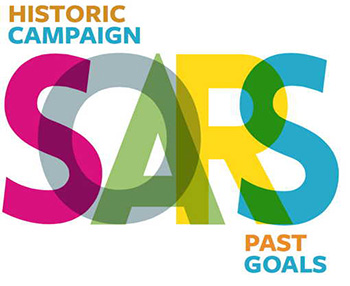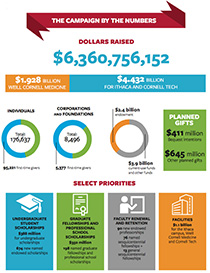COVER STORY

"TRANSFORM"
Historic campaign soars past goals:
Every part of Cornell transformed for the future
It was an act of faith, in Cornellians and in the university, that strengthened over time and gathered momentum for Cornell that continues today.

Cornell's comprehensive campaign, launched in 2006, soared toward its finish Dec. 31, 2015, to a record $6,360,756,152 in gifts contributed by record numbers of alumni, parents, friends and organizations.
It survived the Great Recession, rebounded with a mid-campaign name change – from "Far Above … The Campaign for Cornell" to "Cornell Now" – and exceeded many of its goals. It became the largest campaign in Cornell's history and one of the largest in American higher education, culminating at the stroke of midnight on the last day of 2015, the university's sesquicentennial year.
In total, some 176,637 individual donors and 8,496 corporations and foundations contributed to the university's Ithaca campus, Cornell Tech and Weill Cornell Medicine. They added $2.4 billion to Cornell's endowments and $3.9 billion for current use and facilities.
The campaign's goals combined a sharp focus on Cornell's strategic priorities with a readiness to pivot toward new opportunities for the university's future, succeeding as a result of an outpouring of generosity from Cornell's benefactors. Their resources have reached every Cornell campus and each one of Cornell's colleges, schools and units, impacting the lives and work of all of Cornell's 21,904 students and 1,648 faculty.
"This 10-year endeavor has touched so many programs and so many lives," says campaign co-chair Jan Rock Zubrow '77. "It has had an incredible impact on Cornell University and on Cornell's place in the world, touching nearly every part of the university, enhancing programs everywhere in our 14 schools and colleges, and in the many units, centers and institutes across our three campuses."
Throughout the campaign, collective support from Cornell's alumni, parents and friends, as well as from corporations, foundations and other organizations has helped Cornell to:
- ensure that the best and brightest students can attend Cornell regardless of their ability to pay;
- renew and strengthen Cornell's faculty;
- lay the groundwork for new academic programs, cross-departmental collaborations and outreach;
- create an entirely new and innovative approach to graduate education with the creation of Cornell Tech;
- invest in important infrastructure to enhance Cornell's campuses; and
- accelerate the pace of clinical care, medical education and research at Weill Cornell Medicine.
"Transformational. That is the single word I would use to describe the impact of the campaign on Cornell," says Stephen Ashley '62, MBA '64, campaign co-chair.
